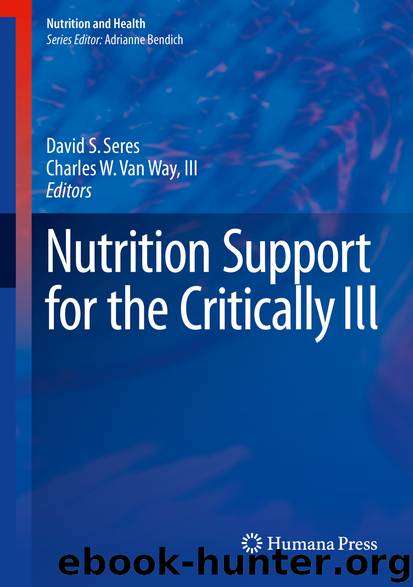Nutrition Support for the Critically Ill by David S. Seres & Charles W. Van Way III

Author:David S. Seres & Charles W. Van Way, III
Language: eng
Format: epub
Publisher: Springer International Publishing, Cham
Management of “Surgical Diseases”
Some diseases absolutely require surgical therapy. Patients with intestinal perforation need immediate operation, for example. But there is also a group of “surgical diseases” which may or may not require operative therapy. Dealing with this group of diseases is often challenging. It is not so much that they are difficult to manage, although some of them are, as that they involve difficult cross-specialty decision making.
Intestinal Obstruction
In many ways, this is the prototype “surgical disease.” Usually, this is secondary to adhesions from an old operation. Patients presenting with obstruction have a generally good prognosis for recovery without further operation. Gastric decompression using a nasogastric tube will relieve much of the distension. By aspirating swallowed air, gastric suction will help to relieve intestinal dilatation. In a majority of patients, the obstruction will resolve in a few days. But a minority, perhaps 20–30 %, do not. If they become acutely worse, and develop peritoneal signs, they need immediate operation. More commonly, they simply fail to improve. Anywhere from a few days to 2 or 3 weeks may elapse before they have operative intervention. The rule here is similar to the postoperative patient. If the patient has been vomiting for a week or more, and is unable to eat, he or she is acutely malnourished. Nutrition support should be started immediately after admission. If the patient has been observed for several days, unable to eat, and is no better, then after 5 days or so, he or she should be fed. In both cases, feeding will require parenteral nutrition.
This is problematic from a practical standpoint. First, there is a general reluctance on the part of the care team to “admit defeat” and begin parenteral nutrition. Second, the decision to begin parenteral nutrition is, or should be, associated with a decision to continue nonoperative therapy for a week or more.
If the patient is then operated upon, what about postoperative nutrition? As was discussed in a previous section, a patient who has been NPO for a week or more will benefit from immediate postoperative nutrition. But this usually requires parenteral nutrition, which brings up the same problem as preoperative nutrition support. There is a tendency to believe that all patients will be immediately cured following operation for obstruction. Unhappily, this is simply not true. Patients with obstruction preoperatively very commonly have a prolonged postoperative recovery, and to be unable to eat for a week or more .
Download
This site does not store any files on its server. We only index and link to content provided by other sites. Please contact the content providers to delete copyright contents if any and email us, we'll remove relevant links or contents immediately.
Nutrition for Sport, Exercise, and Health by Spano Marie & Kruskall Laura & Thomas D. Travis(3774)
Nutrition for Sport, Exercise, and Health by Marie Spano & Laura Kruskall & D. Travis Thomas(3723)
The Sprouting Book by Ann Wigmore(3586)
Flavor Flours by Alice Medrich(2861)
Superfood Smoothie Bowls: Delicious, Satisfying, Protein-Packed Blends that Boost Energy and Burn Fat by Chace Daniella(2455)
Memory Rescue by Daniel G. Amen(2418)
Dirty Genes by Ben Lynch(2313)
The Bad Food Bible by Aaron Carroll(2271)
Genius Foods by Max Lugavere(2217)
The Poisoner's Handbook by Deborah Blum(2135)
Good Calories, Bad Calories by Gary Taubes(2106)
The Main Street Vegan Academy Cookbook by Victoria Moran(2078)
The I Quit Sugar Cookbook by Sarah Wilson(2038)
Core Performance Essentials by Mark Verstegen(2008)
Memory Rescue: Supercharge Your Brain, Reverse Memory Loss, and Remember What Matters Most by Amen Dr. Daniel G(1974)
Big Girls Do It Stronger by Jasinda Wilder(1953)
Android App Development by Franceschi Hervé J.;(1841)
Sugar Crush by Dr. Richard Jacoby(1795)
Dr. Colbert's Keto Zone Diet by Don Colbert(1651)
